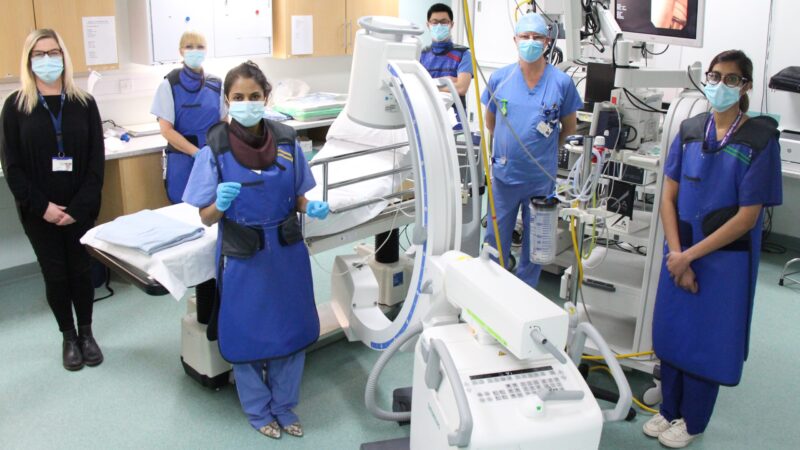
A cancer patient can now receive curative treatment thanks to an innovative diagnostic method performed for the first time in the UK by our respiratory team.
Kathleen Jackson was referred to the University Hospital of North Tees by Mr Sion Barnard, Cardiothoracic Surgeon at Newcastle Hospitals NHS Foundation Trust for the innovative method to sample lung abnormalities that are suspected to be early lung cancer. These are often far out in the lungs and hard to reach using conventional methods.
The procedure was performed by Respiratory Consultants, Dr Vandana Jeebun and Dr Victor Chew. They used a novel technique which involves thin cameras to reach far into the lungs paired with an ultraminiature cryoprobe which then freezes and samples abnormalities.
I’m living life again now. You can’t fully live life when something unknown is hanging over you, but now the carcinoid has been confirmed, the treatment can properly begin.
Kathleen
The sample collected from the 1.1mm thick cryoprobe can be sent for analysis by a pathologist.
The explorative procedure is less invasive for patients. They are sedated for their own comfort but fully conscious throughout.

Kathleen had been experiencing discomfort and pain in her chest for some time before the procedure.
She continued: “To be honest, it wasn’t a particularly pleasant experience. But everyone in the room was lovely and put me at ease. It was well-worth it to obtain the diagnosis so we know exactly what it is and how to treat it.
“I am confident about having an operation in the New Year which I am sure will be successful.”
“The procedure went smoothly”
Vandana Jeebun commented: “This tiny cryoprobe has never been commercially used in UK before. But I felt it was specifically suited for this patient, on whom previous methods of biopsy at her own hospital have proven unsuccessful.
“The procedure went really smoothly and the equipment gathered the samples quickly and easily. It is different from the other cryoprobes we have used before for suspected lung cancer and fibrosis, due to ultraminiature size and its ability to get far out in the lungs with great flexibility. It is an exciting new tool that can help many other patients.
“We are reassured that as a result of this procedure, we now have a diagnosis and that she is able to access curative treatment. She’s now in the highly competent hands of the Freeman surgical team, and we’re confident her treatment will be successful.”

“It offers hope”
Sion Barnard is a Cardiothoracic Surgeon at Newcastle Upon Tyne Hospitals. He added: “Small nodules in edges of the lung, or near its very centre are usually quite easy to diagnose by one of several methods, so appropriate treatment of the condition based on a biopsy can be offered. Nodules more deeply placed in the lung are more problematic and, due to their depth, may remain undiagnosed for some time or require a larger surgical operation to excise them, including losing up to half a lung for what could turn out to be a benign condition.
“This new technique offers hope for those patients with deeply seated nodules in the lung that can be sampled and go into treatment in the knowledge of a firm diagnosis and is an extra diagnostic approach.
“Although the patient was referred from Durham to Newcastle, it was straightforward to engage with this new service in North Tees and get a result for the patient promptly to allow her to be seen in the next clinic and have the biopsy result explained to her.”